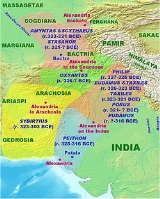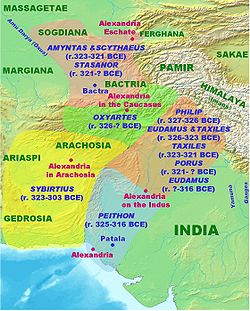
Oxyartes
Encyclopedia

Bactria
Bactria and also appears in the Zend Avesta as Bukhdi. It is the ancient name of a historical region located between south of the Amu Darya and west of the Indus River...
n, father of Roxana
Roxana
Roxana sometimes Roxane, was a Bactrian noble and a wife of Alexander the Great. She was born earlier than the year 343 BC, though the precise date remains uncertain....
, the wife of Alexander of Macedon. He is first mentioned as one of the chiefs who accompanied Bessus
Bessus
Artaxerxes V, also known as Bessus was a prominent Persian nobleman and satrap of Bactria, and later self-proclaimed king of Persia...
on his retreat across the Oxus river
Amu Darya
The Amu Darya , also called Oxus and Amu River, is a major river in Central Asia. It is formed by the junction of the Vakhsh and Panj rivers...
into Sogdiana
Sogdiana
Sogdiana or Sogdia was the ancient civilization of an Iranian people and a province of the Achaemenid Empire, eighteenth in the list on the Behistun Inscription of Darius the Great . Sogdiana is "listed" as the second of the "good lands and countries" that Ahura Mazda created...
(329 BC
329 BC
Year 329 BC was a year of the pre-Julian Roman calendar. At the time, it was known as the Year of the Consulship of Privernas and Decianus...
). After the death of Bessus, Oxyartes deposited his wife and daughters for safety in a rock fortress
Sogdian Rock
Sogdian Rock or Rock of Ariamazes, a fortress located north of Bactria in Sogdiana , was captured by the forces of Alexander the Great in 327 BC as part of his conquest of the Achaemenid Empire.-Background:...
in Sogdiana, which was deemed impregnable, but which nevertheless soon fell into the hands of Alexander, who not only treated his captives with respect and attention, but was so charmed with the beauty of Roxana as to design to make her his wife. Oxyartes, on learning these tidings, is said to have hastened to make his submission to the conqueror, by whom he was received with the utmost distinction; and celebrated by a magnificent feast the nuptials of his daughter with the king, 327 BC
327 BC
Year 327 BC was a year of the pre-Julian Roman calendar. At the time, it was known as the Year of the Consulship of Lentulus and Philo...
.
Shortly after we find him successfully interposing to prevail upon Chorienes to surrender his rock fortress; and at a subsequent period he was appointed by Alexander satrap
Satrap
Satrap was the name given to the governors of the provinces of the ancient Median and Achaemenid Empires and in several of their successors, such as the Sassanid Empire and the Hellenistic empires....
of the province of Paropamisadae
Paropamisadae
Paropamisadae or Paropamisus was the ancient Greek name for a region of the Hindu-Kush in eastern Afghanistan, centered on the cities of Kabul and Kapisa .-History of Paropamisadae:...
, in India
History of India
The history of India begins with evidence of human activity of Homo sapiens as long as 75,000 years ago, or with earlier hominids including Homo erectus from about 500,000 years ago. The Indus Valley Civilization, which spread and flourished in the northwestern part of the Indian subcontinent from...
. In this position he continued until the death of Alexander (323 BC
323 BC
Year 323 BC was a year of the pre-Julian Roman calendar. At the time, it was known as the Year of the Consulship of Longus and Cerretanus...
), and was confirmed in his government, both in the first division of the provinces immediately after that event, and in the subsequent one at Triparadisus, 321 BC
321 BC
Year 321 BC was a year of the pre-Julian Roman calendar. At the time, it was known as the Year of the Consulship of Calvinus and Caudinus...
.
At a later period we find him sending a small force to the support of Eumenes
Eumenes
Eumenes of Cardia was a Thracian general and scholar. He participated in the wars of the Diadochi as a supporter of the Macedonian Argead royal house.-Career:...
; but after the death of that general, 316 BC
316 BC
Year 316 BC was a year of the pre-Julian Roman calendar. At the time, it was known as the Year of the Consulship of Rutilus and Laenas...
, he seems to have come to terms with Antigonus
Antigonus I Monophthalmus
Antigonus I Monophthalmus , son of Philip from Elimeia, was a Macedonian nobleman, general, and satrap under Alexander the Great. During his early life he served under Philip II, and he was a major figure in the Wars of the Diadochi after Alexander's death, declaring himself king in 306 BC and...
, who was content to assume the appearance of confirming him in an authority of which he would have found it difficult to dispossess him. It seems probable that he must have died before the expedition of Seleucus
Seleucus I Nicator
Seleucus I was a Macedonian officer of Alexander the Great and one of the Diadochi. In the Wars of the Diadochi that took place after Alexander's death, Seleucus established the Seleucid dynasty and the Seleucid Empire...
against India, as we find that monarch ceding Paropamisus to Chandragupta Maurya
Chandragupta Maurya
Chandragupta Maurya , was the founder of the Maurya Empire. Chandragupta succeeded in conquering most of the Indian subcontinent. Chandragupta is considered the first unifier of India and its first genuine emperor...
, without any mention of Oxyartes.
External links
----

